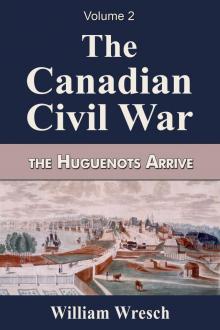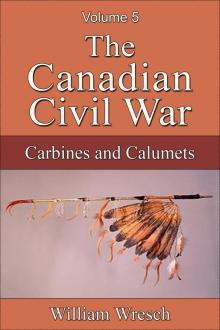- Home
- William Wresch
The Canadian Civil War: Volume 5 - Carbines and Calumets
The Canadian Civil War: Volume 5 - Carbines and Calumets Read online
The Canadian Civil War
Volume 5
Carbines and Calumets
By William Wresch
Copyright 2014 William Wresch
Thank you for downloading this ebook. This book remains the copyrighted property of the author, and may not be redistributed to others for commercial or non-commercial purposes. If you enjoyed this book, please encourage your friends to download their own copy from their favorite authorized retailer. Thank you for your support.
Chapter 1 –
The first battle
The reserve base in Arkansas had nominally been in revolt for months, but cooler heads essentially ignored that fact. The place was buttoned up and no one had tried to emerge and cause any trouble. Why not just leave sleeping dogs lie, and hope that the soldiers there would get tired of being rebels, or at least tired of sitting in the same buildings doing not much of anything? It seemed like a plan that was working, or at least had not yet failed.
Colonel LeBouche had other ideas. He had a battalion of men, some light armor, and orders that seemed just vague enough to let him do what he wanted to do. On August fifteenth he decided what he wanted to do was end the insurrection. After giving what no doubt seemed like a rousing speech to him, he ordered his men into vehicles and started driving. The five armored personnel carriers took the lead, followed by six trucks, and several jeeps. He was in one of the final jeeps. While he commanded over four hundred men, he only had transportation for one hundred and eighty, so that’s how many he took. The remainder would come later after he had captured the base.
The drive from his base was just over an hour. The long convoy was quite a sight along the highway. How often do you see so many military vehicles moving in tight formation down a major highway? Lots of people took pictures. Many of those pictures were emailed to friends. Friends then forwarded the emails to other friends, the result being that a very good percentage of the Arkansas population knew a convoy was headed straight toward the reserve base -- eventually, so did the reserve base.
When the convoy finally arrived, there was some question about how it would actually attack the base. The colonel had talked about taking the base by surprise, and directing all his forces at the main gate. So that’s where the lead driver took his APC. But when he actually reached the gate, he was less sure about whether he should barrel on through the gate, stop and try to sneak on to the base claiming to be a relief column, or just point his guns at the guards and accept their surrender. He liked the last idea best, so that is what he did. He pointed his mounted machine gun at the guard shack, and told them to surrender. The guards raised their hands and backed away, so for about thirty seconds it looked like things were going to be simple.
At this point the base moved its APCs out from hiding, and even rolled a small tank into view. They had had fifteen minutes to get ready for the invaders, and while they were still running around and bringing up ammunition and locating weapons, fifteen minutes had been plenty of time to fire up diesel engines and get the heavy stuff moved to the front gate.
Who fired first? Each claimed the other. But there was no disagreement over who fired more effectively. LeBouche’s convoy was still in a single column. The only vehicle capable of firing was the lead vehicle. Meanwhile, the five vehicles the base had brought up were in a neat crescent that allowed all five to fire unimpeded, which is what they did. LaBouche’s personnel carriers were pretty well armored, but every man who was standing at a portal was killed instantly. The tank fired one round (all they had) and missed the APCs but hit the lead truck. It exploded instantly. At this point every other vehicle in the column scattered and fled down side streets or back the way they had come. LeBouche sat in his jeep through most of this, then his driver took off as well, leaving behind three badly shot up APCs and a burning truck. In the end, eight of his men were dead, thirteen wounded, and another five surrendered. The “Tank Battle of Little Rock” was over.
The next forty eight hours were touch and go. Many in the south argued for a counter attack. Others issued calls for volunteers to save their state. Every mouth with a megaphone or a radio show declared it was time to protect their rights and teach the other side a lesson. Battles might have been launched and states invaded by other states, except that local politicians generally wanted their own time on stage, so they called for state legislatures to return to session so declarations could be made and statements issued. They needed their share of camera time. That saved the immediate situation, but just built tension for later. Eventually speeches would end, resolutions would be passed, and Canada might break apart.
The immediate response from the Canadian military was simple. LeBouche and his immediate superior were given early retirement. The long term response was more complicated. Did they call up all reserves? If so, which army would the reserves report to? Would calling up the reserves precipitate the war the country had been avoiding for the past two years? Or would a show of strength give support to cooler heads in the south? Presumably a decision on which strategy to pursue had been debated non-stop for the last two years. If a decision had been reached, it was not visible yet to the general public. In general, in the north uniforms stayed out of sight. In the south, uniforms were on parade. Days passed, people talked, politicians gave speeches.
Back in Green Bay, August was its usual awful self. Green Bay – the water, not the city – had a layer of green algae over much of the southern end. The stench was awful. Speaking of awful, we had come back to see the repairs done to our home. Where once had been large south facing windows (when you only get nine hours of sunlight in December and January, large windows matter), we now had a stone wall about four feet high topped by small windows. If we had ordered a stone wall with firing slits on top, this is what we would have gotten. I took one look and my hands automatically clenched.
Elise took one look and said, “Those are nice stones. When things settled down, you can rebuild the wall with large windows, and we can use the stones in the garden.” What is it like to live with a woman who always knows the right thing to say? Pretty nice. Inside the house, we found some of the furniture had been replaced and everything had been cleaned. You would never know the house had been blown up a month earlier. They must have imported workers from outside Canada.
We settled back into our old routine pretty readily. Elise spent long days at the ministry, but every employee had at least one day off each week. We lived for Sundays. I got back to the university. I had new insights for the Jolliet biography I was working on, and I had some new material. The memory stick Jean had given me contained marvels. Sitting in the sideboard of the Jolliet mansion had been materials that should have been in an archive. They were amazing, but also confusing. It was like people had just thrown things in there over two centuries. Some had faded past recognition, and other materials were undecipherable. There were several pictures, but no captions. Who were these people? There were bills of sale for various items, including livestock and farm acreage. Three journals were in the pile, as was a treaty signed with a band of Mohicans who apparently had been traveling through. Everything in that drawer belonged in a museum. I would mention that to Claude Jolliet the next time we saw him.
Speaking of the ex-president, his condition was unchanged, and not good. Elise and I went to see him soon after our return, and we were given five minutes with him. He had been moved from the hospital to one of the Jolliet homes. It was a rambling old place that had been added onto several times and not benefitted architecturally from the changes. Most of the home was occ
upied by a grand niece of his and her family. There were small kids, and their noise was music in the house. It seemed to be Claude’s one joy. He was in a corner bedroom on the first floor, a suite really, with two adjoining rooms for the attendants he now needed constantly. He smiled when he saw us, and he listened a short time while we described the flood in Kaskaskia. I tried to be entertaining and told him about my efforts in a dragon boat. And he was patient, but he also seemed to tire incredibly fast. When we asked him how he was doing, he said he tried to write condolence letters to all the people in his household who had been killed in the terrorist attack, but it was slow work. He had only completed four so far, and there were so many more to do. At that point his head dropped a bit and an attendant told us it was time for him to rest. We left wondering if we were seeing a great man fade away.
When I wasn’t exploring the images Jean had given me, I did finally write up a long report for Senator Dodson. He wanted to know about Tilden Foster, and I had much to tell. I covered the historical reenactments he had supported in Louisiana, then the attacks he had precipitated in Dakota, and finished with what I knew about the Foster ownership of the LeGuerre Logistics warehouse that seemed to be the storage location for LNA weapons. With this additional information, would the good senator be able to curb the Foster family aggressions? One could only hope.
In the meantime, our family was bearing the brunt of the battle with the Fosters. We wondered how they would come after us after I had cost them their mining contract in the north. We now saw how they were going to do it – they would go after our trucks. Suddenly we had hijackings on the road and serious vandalism at truck stops, both in Canada and in the U.S. They steered thugs our way. Our security people caught some of them, but there seemed to be no end to them. Were these LNA or just garden variety thugs? Who knew? We would get a few arrested and then get back to find more damage. The Canadian authorities were very helpful in responding to our calls, and we came to use selected truck stops where security was better, but still, our costs were being pushed up. We raised prices a bit to try to recoup, but that cost us several contracts. Bad as that was, we were not sure if this was the entire approach – a death of a thousand cuts – or if these attacks were just a distraction while the Fosters planned something larger.
Could we hit back? Michael had all kinds of wild ideas, only a few of which were legal. Catherine meanwhile, was studying the family, using all the public sources she could find, and then hiring a firm to look into the not-so-public sources. My information about the LeGuerre warehouse backed up some information she had already collected. What she wanted was a sense of where the money would flow next. Michael was pretty impatient with her as he wanted to strike now, but she was adamant that we wait until we saw what big project was next, and then undercut that before they could defend their position. It was a pretty subtle approach, but seemed effective, and that was the direction my dad approved.
While she tracked money, the Canadian government tracked people. The manager of the LeGuerre warehouse was arrested. The fire had destroyed lots of records and most of the remaining weapons, but enough was left to build a case against him. But I was pretty sure they had no real interest in him; they wanted him to rat out the people who had put the weapons there and paid to ship them. Nothing public was said about whether he was talking or not, but in the meantime his company was shut down, and all Canadian companies owned by the Foster brothers got extra scrutiny. Whatever that was costing the Fosters in legal and compliance costs was payback long overdue.
Meanwhile life went on. What’s it like to live in a capital city while provincial legislatures meet to call their national government vile names? It would have been easier if some of the attacks weren’t justified. To the average person on the street, the lacrosse murder still loomed large, and the attack on the Arkansas reserve base still rankled. The base commander there played his hand exceedingly well. It wasn’t enough that he had defeated a column of troops, but he then handled the peace exceptionally well. He made sure all the wounded attackers were taken to local hospitals where they could be shown to receive fine care. Then he released all his prisoners, doing it at mid day in front of a public gathering at the main gate. With the burned out vehicles in the background, he lectured the prisoners on the error of their ways, the folly of Canadians attacking Canadians, and then released them. The fact that their units were too stupid to provide transportation for the men was the icing on the photographic cake, as the men walked a few yards from the base and then stood there wondering how to get home. Two colonels earned early retirement for that fiasco. Eventually a lady in a minivan gave them a lift back to their base.
At the university there were lots of staff meetings. No one wanted to call them “Preparing for War,” so the meetings were titled things like “Safety in times of conflict.” I don’t know if the calmer titles were all that helpful. And the meetings themselves had limited value. If shooting started, would there be an attack on the university? Would the south use airplanes? Missiles? Artillery? Really, could it come to that? No one wanted to develop a response to any of that, so meetings took the form of discussions of when classes might be cancelled and how students might be evacuated. It was decided to delay the start of the fall semester about two weeks, until late September, on the hope that everything would be settled by then. Left unsaid was the obvious fact that the shooting might be so intense by then that class cancellations would be automatic. In the meantime we had meetings and planned for the unplanable.
Then there was the wedding. Obviously we had not gotten married in May. Good thing, since Kaskaskia would have been the worst honeymoon of all time. But we had hoped for something in the fall. Periodically Elise and a few of her friends would take a long lunch and try on dresses. I had gotten a tux that she approved of, so I was ready whenever. But wedding dresses are not to be rushed into. I think it gave Elise and her friends some time together, and I am sure it was fun in its own way. Lord knows Elise had every right to some fun. Elise’ sisters had taken complete charge of decorations, and were happy to tell us all about their latest choices when we were over at their house for Sunday dinner. I have no idea how you plan decorations when you don’t know when a wedding will take place or where, but it didn’t seem to be slowing them down at all. One Sunday it was napkins, another Sunday it was floral arrangements, and then it might be back to napkins or off to center pieces. Meanwhile the Sundays of July and August went past and September didn’t look any more promising. You would think that might dampen some of the planning enthusiasm, but if it did, I couldn’t detect it. I was beginning to like those girls.

 The Canadian Civil War Volume 2- The Huguenots Arrive
The Canadian Civil War Volume 2- The Huguenots Arrive The Canadian Civil War: Volume 5 - Carbines and Calumets
The Canadian Civil War: Volume 5 - Carbines and Calumets The Canadian Civil War: Volume 4 - Mississippi Beast
The Canadian Civil War: Volume 4 - Mississippi Beast The Canadian Civil War: Volume 1 - Birth of a Nation
The Canadian Civil War: Volume 1 - Birth of a Nation The Canadian Civil War: Volume 3 - West to the Wall
The Canadian Civil War: Volume 3 - West to the Wall